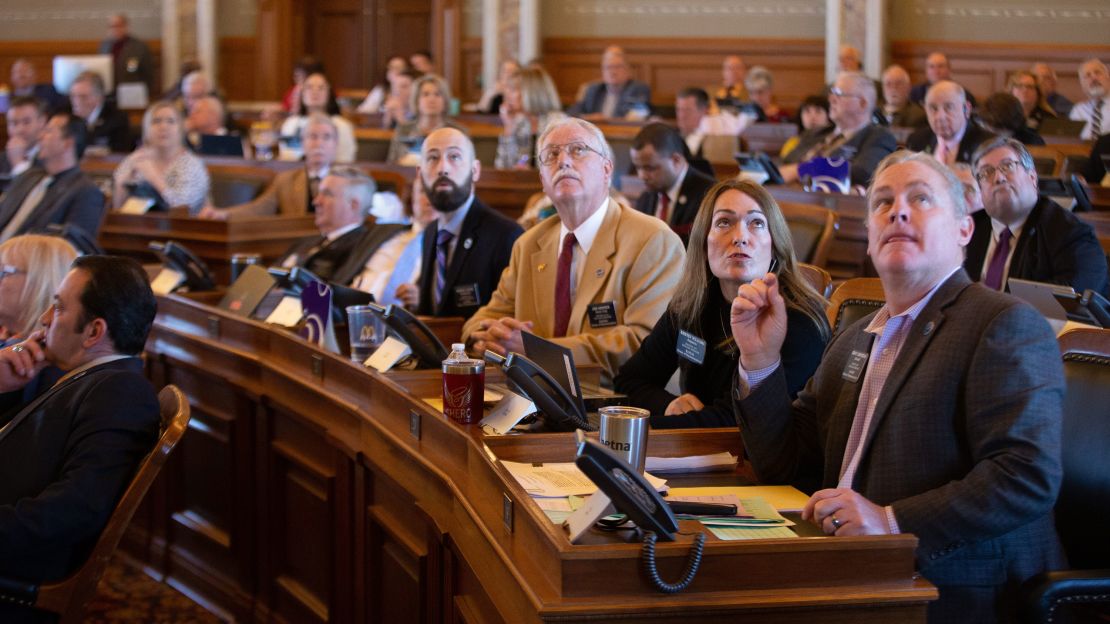Proposed restrictions on gender-affirming care faced new hurdles in Kansas, Missouri and Tennessee this week, as health care for transgender patients evolves into a hallmark issue for Republican-led states and GOP-controlled assemblies.
The US Justice Department sued to challenge a new Tennessee law banning certain medical care to transgender youth, while a Missouri judge temporarily blocked limits on gender-affirming care – issued by the state attorney general – from taking effect Thursday. And in Kansas, state lawmakers on Wednesday fell short of the two-thirds majority needed to override the governor’s veto of a bill that would strip physicians of their licenses if they provide care to those under age 18.
The showdowns this week come as red states nationwide have taken up legislation or sought to implement restrictions related to gender-affirming care – medically necessary, evidence-based care that uses a multidisciplinary approach to help a person transition from the gender they were designated at birth to their affirmed gender, or the one by which they want to be known.
Supporters of these restrictions often express concern about long-term impacts of this care for children and whether children are capable of making those decisions, even if their parents consent. But major medical associations agree gender-affirming care is clinically appropriate for children and adults with gender dysphoria, according to the American Psychiatric Association.
Here’s a look at the state of legislation and restrictions on gender-affirming care in Tennessee, Missouri and Kansas.
Tennessee
The Justice Department Wednesday filed a complaint challenging legislation signed into law by Tennessee’s governor last month banning certain medical care to transgender youth, the department said in a news release. It asked a court to issue an order preventing the law from going into effect July 1.
SB 1, which Republican Gov. Bill Lee signed March 2, prohibits health care providers from performing or administering care or procedures to a minor “for the purpose of enabling a minor to identify with, or live as, a purported identity inconsistent with the minor’s sex.” Additionally, the law would allow the Tennessee attorney general to fine health care professionals with a civil penalty of $25,000 per violation.
But the DOJ says the legislation violates the 14th Amendment’s Equal Protection Clause, the complaint alleges, by “unjustifiably denying” transgender minors “access to certain forms of medically necessary care.”

“No person should be denied access to necessary medical care just because of their transgender status,” Assistant Attorney General Kristen Clark, of the DOJ’s Civil Rights Division, said in a news release.
“The right to consider your health and medically-approved treatment options with your family and doctors is a right that everyone should have, including transgender children, who are especially vulnerable to serious risks of depression, anxiety and suicide,” she said.
In a brief statement, Gov. Lee called the DOJ complaint “federal overreach at its worst” and vowed to fight in court.
“Tennessee is committed to protecting children from permanent, life-altering decisions,” Lee said.
Missouri
Also Wednesday, a Missouri judge temporarily blocked limits on gender-affirming care for both minors and adults, halting them from going into effect as planned Thursday and giving the court time to consider relief in a lawsuit seeking to strike down the emergency rule issued by Attorney General Andrew Bailey.

Among other stipulations, the restrictions say it is “unlawful” to provide gender-affirming care without confirmation a patient has “for at least the 3 most recent consecutive years … exhibited a medically documented, long-lasting, persistent and intense pattern of gender dysphoria.”
The emergency rule claims people often take “life-altering interventions,” like pubertal suppression or gender transition surgery, “without any talk therapy at all,” saying the action was needed to “protect the public health, safety, and welfare” of Missourians. If ultimately allowed to take effect, the rule would expire February 6, 2024, per Bailey’s office.
“We’re glad that the court is taking this seriously and we hope that the rule will be enjoined after she considers all the evidence in front of her,” said attorney Gillian Wilcox of the American Civil Liberties Union of Missouri, which is providing representation to the plaintiffs, including a transgender adult, two transgender youth, a St. Louis center providing treatment for gender dysphoria and a social worker.
Their lawsuit claimed Bailey had exceeded his authority, calling the rule “an improper, extra-legislative overreach by an un-elected political appointee.”
Meantime, a spokesperson for Bailey’s office said it “will continue fighting for all patients to have access to adequate health care.”
Kansas
Kansas Republican lawmakers failed to obtain the votes necessary to override Democratic Gov. Laura Kelly’s veto of a bill that would make the state medical board revoke licenses of health care professionals who provide gender-affirming care to a child under age 18, including various types of surgery, or the prescribing of puberty blockers or hormone treatments.

Kelly vetoed the bill, SB 26, and several others on April 20, citing in a message to the legislature the threat such bills would pose to the state’s economic wellbeing.
“By stripping away rights of Kansans and opening the state up to expensive and unnecessary lawsuits, these bills would hurt our ability to continue breaking economic records and landing new business deals,” the governor wrote.
The Kansas Senate’s motion to override the veto on SB 26 failed with a 26-14 vote.
CNN’s Devan Cole, Amy Simonson and Shawna Mizelle contributed to this report.




